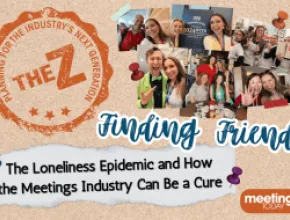Meetings Today Content Engagement Director Christoph Trappe caught up with MPI Head of Meeting Innovation Jessie States following one of several sessions she led as a speaker at IBTM World 2018.
This particular conversation revolves around States’ presentation about event flexibility and being prepared for meetings emergencies titled “It’s an Emergency: What Will You Do When Everything Goes Wrong?”
Watch the interview with Jessie States in the embedded, 360-degree video below:
Editor's Note: Click or press and hold your mouse or finger on the 360 video to move the camera around.
Or keep scrolling to read a full transcript of the conversation.
Christoph Trappe (CT): Hi everyone. It’s Christoph Trappe with Meetings Today. I’m joined by Jessie States. And she just did a great talk at IBTM World here in Barcelona. Thanks for joining us.
Jessie States (JS): Hi. Nice to be here.
CT: And she’s the head of meeting innovation at MPI. So I’m slighting jealous of that kind of title. That is really awesome. So, we listened to the talk.
Your talk was about how are you prepared, how do you adjust, I would say on the fly?
JS: Yes. Yes. We talk about kind of adjusting on the fly. But there’s actually a process to responding to incidents that occur at your meetings or events. So, it’s kind of not just like coming up with some actions to take, what do we need to do? There’s an actual process that you need to take in order to address any kind of incident that occurs at your meetings or events. And that begins with assessing the situation.
[Additional IBTM World Coverage: How Event Planners Can Use Content Marketing]
Before you can do anything, you have to know exactly what’s going on or as much information as you possibly can about what’s going on. You can’t kind of create your actions or what you want to do until you really understand the threats associated with any incident that’s occurred.
And after that, you want to make sure that you set some goals and objectives for yourself. So, what are we trying to accomplish with whatever actions we need to take?
And then you can step back and start to look at what action items or tactics you need to take in order to resolve, mitigate or reduce the risks of what’s happening according to the incident that’s occurring.
CT: And you have to do that pretty quickly.
JS: Sometimes you only have minutes. Sometimes you have less than that. So, with the meeting planning process, with months, sometimes we have years if we’re lucky, to plan a meeting or event.
But planning for an incident has to occur in a mere minute sometimes.
CT: And some of the examples you were talking about, they’re like the speaker being sick or the speaker not making it or attendees not making it. Or terrorist attack or a fight on stage.
JS: Yes.
CT: I’ve gone to so many conferences, I can’t tell you that I’ve ever seen any of those things.
JS: I did see—I presented a session in which I discussed a possible attendee altercation at a meeting recently and no one in the audience had kind of ever had that happen, but there was one woman walking by and she was just kind of like, “Yep.”
So, we think that could never happen at our events, but there are our peers it’s already happened to.
CT: So, how do you get over that hump to be prepared for the things that may or may not happen?
JS: It’s hard because it can be absolutely overwhelming when you think about the number of things that could go wrong at your meeting or event. So, it’s really important to conduct a thorough risk assessment, to understand what are some of the things that are the most likely to happen? And what are some of the things that have the most consequences and plan for both of those things.
So, you might have bosses that say, “That could never happen at our meetings. Why are you even talking to me about safety and security?” But we always say that until something happens. And what we don’t want to do is wait until something happens and not be prepared for it.
So, it’s much better to take appropriate actions ahead of time, to plan for the risks that need to be planned for and have a really good impromptu planning process for when something goes wrong that you didn’t expect.
CT: Great. Thank you for the overview. Great session. Appreciate it.
JS: Thank you.
Video transcription provided by Katie Downing and edited by Eric Andersen (Digital Content Specialists).
Related Articles With Input From MPI's Jessie States:





